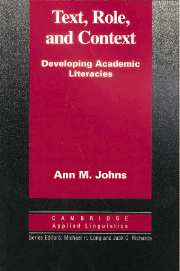Book contents
- Frontmatter
- Contents
- Series editors' preface
- Preface
- Acknowledgments
- 1 Literacy and pedagogy: Three views
- 2 Genre knowledge and socioliteracies: What readers and writers may share
- 3 Genre and social forces: “Homely” and academic texts
- 4 Discourse communities and communities of practice: Membership, conflict, and diversity
- 5 Special roles: Literacy practitioners as campus mediators and researchers
- 6 Students as researchers: Investigating texts, processes, and contexts
- 7 The socioliterate classroom: Basic tenets and goals
- 8 Putting tenets and goals into practice: Using portfolios in literacy classrooms
- 9 Conclusion
- References
- Index
Preface
Published online by Cambridge University Press: 05 October 2012
- Frontmatter
- Contents
- Series editors' preface
- Preface
- Acknowledgments
- 1 Literacy and pedagogy: Three views
- 2 Genre knowledge and socioliteracies: What readers and writers may share
- 3 Genre and social forces: “Homely” and academic texts
- 4 Discourse communities and communities of practice: Membership, conflict, and diversity
- 5 Special roles: Literacy practitioners as campus mediators and researchers
- 6 Students as researchers: Investigating texts, processes, and contexts
- 7 The socioliterate classroom: Basic tenets and goals
- 8 Putting tenets and goals into practice: Using portfolios in literacy classrooms
- 9 Conclusion
- References
- Index
Summary
What assists students to continue to develop as readers and writers? How can we prepare and motivate them to succeed not only in our literacy classes but in their academic and professional careers? How can we involve campus faculty and administrators in this essential literacy effort? Questions like these plague practitioners in academic institutions throughout the world, for we have taken on an enormous task: to educate and motivate students to confront a myriad of texts, roles, and contexts that we cannot possibly describe or predict with accuracy. The pressure on us is great: Our educational institutions expect us to succeed in an effort to prepare students for any rhetorical or linguist exigency that may arise, to “fix” student illiteracies once and for all so that they can get on with the “real” academic work.
In this volume I argue that the key words in our vocabulary should be “research,” “motivation,” and “preparation.” In our classes we need to motivate students to be literacy researchers, open to and prepared for the many social and linguistic forces that may influence their literate lives. If our students are to succeed, however, we cannot work alone. Education to literate practices must be the responsibility of all instructors, whatever their disciplines. However, others on our campuses will not take up the cause unless they are invited. Therefore we must issue invitations that faculty, and administrators, cannot refuse. Literacy practitioners must act as mediators and consultants as we, and our students, work to make the advancement of literacies a campus goal.
- Type
- Chapter
- Information
- Text, Role and ContextDeveloping Academic Literacies, pp. xi - xivPublisher: Cambridge University PressPrint publication year: 1997

